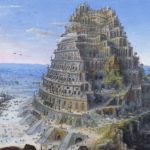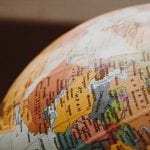Last week, would-be missionary John Allen Chau was murdered on the beach of North Sentinel Island in the Andamans. To try to help us think about this, and the issues associated with it, we spoke to CMS VIC State Director (and historian) Wei-Han Kuan.
TGCA: Wei-Han, I understand that you’ve done a bit of reading on the North Sentinelese people. What can you tell us about them?
They are remarkable people group! A unique, unreached, pre-Neolithic and reclusive tribe. There is no accurate estimate of the population that inhabits a small island in the Andamans about the size of Manhattan. A visual survey in 2011 spotted fifteen individuals. Estimates vary from forty to four hundred, but no one can be sure. That’s largely because of their well-earned reputation for being unfriendly and violently hostile to all outsiders.
Over the last few centuries of recorded contact, the Sentinelese have consistently rebuffed outsiders violently and rejected any form of communication or trade.
TGCA: It sounds like these are the last truly “primitive” people untouched by the modern world. Many people are saying they should be left that way. How would you respond?
Certainly the majority of the press post-John Allen Chau’s death have taken that view. The basic argument is that the Sentinelese, according to anthropologists studying them from a distance, have probably inhabited the island for tens of thousands of years and have no natural immunity to common pathogens like influenza, chickenpox, measles or the common cold. You could kill them with a handshake, which is the worry.
India’s policy with regard to the Sentinelese is therefore one of strict isolation. It is illegal to go within five nautical miles of the island. It’s illegal to photograph them. Contact is absolutely prohibited. P. C. Joshi, Professor of Social Anthropology, Delhi University, describes the islanders as a crown jewel of India – living artefacts to be preserved.
I want to challenge the myth of the noble savage – that somehow, human beings who live close to the land were happier, healthier and wiser, and living in more perfect communities … Eternal life and true good is found only in the Gospel of Jesus Christ.
However, I want to challenge the myth of the noble savage. This the idea popularised in eighteenth century literature but with a long history that somehow, human beings who live close to the land, in their natural state pre-colonisation were happier, healthier and wiser, and living in more perfect communities. Now, that’s an exaggeration, but the basic idea is that tribal peoples are better off without the corruption of modern civilisation. At its heart, the idea of the noble savage is a doctrine of original good in humanity instead of the Bible’s picture of original sin.
Quite apart from the ethical functionality or otherwise of Sentinelese society, Christians, like John Allen Chau, believe that eternal life and true good is found only in the Gospel of Jesus Christ. We have a Great Commission that we need to work out how to apply in their case. Leaving them alone, out-of-sight, out-of-mind to pursue a convenient myth of a noble savage tribe on an idyllic island is not an option for mission-minded Christians.
TGCA: How should we think about issues of sovereignty here? We wouldn’t normally think it right to trespass on the home of a family who didn’t want our help. Is it different for a tribe/island?
Not really, I don’t think. We have to engage in cross-cultural mission respectfully, wisely and lovingly. The Bible tells us to obey the emperor and the government of the land in all things lawful and good. Christians who develop a calling or sense of urgency about the eternal salvation of any particular person or group need to be very prayerful, very wise and take lots of very good counsel.
We see a model of this in Paul’s missionary journeys through Acts. He and his team are certainly prayerful, as is the church in Antioch and elsewhere. Paul takes counsel to go or to stay in a place. He operates within the law, even when the law is used against him. He is respectful to jailors and governors, challenging them only when it comes to the claims of the Gospel itself.
Missions-minded Christians go all over the world legally, respectful of local laws and cultures and customs, breaking down every barrier in order to win the right to bear witness to Jesus. We go as humble servants of the Word.
TGCA: In an interview you did on this matter,* the BBC interviewer said that it might be permissible to help the Sentinelese medically but not to ‘preach religion’ to them. What do you think of that distinction?
‘Not very much!’ is the short answer. Of course they are two different things, but if we pull back to get more perspective, we realise really quickly that to love and to do good to the Sentinelese actually means doing the hard work of thinking through this complex situation.
‘Jesus Christ makes everything good for everyone, everywhere.’ I have that on my whiteboard at CMS. It means that every person is in a parlous state of sin and sub-optimal life this side of eternity apart from Christ, and only Jesus can change that. That means the Sentinelese need Jesus to improve their society, their health outcomes, their relationships, their hopes, dreams and fears.
Jesus Christ makes everything good for everyone, everywhere. That means the Sentinelese need Jesus to improve their society, their health outcomes, their relationships, their hopes, dreams and fears.
The problem is that no one knows what the true position of Sentinelese society really is. The Indian government and departments of anthropology and mass media have all bought into the myth of the noble savage. What are their rates of domestic violence? Infanticide? Or on the flip side, do they have the miracle cure for cancer there?
TGCA: Some Christians are saying that John Allen Chau was doing a good thing in an unwise way? What has been your assessment?
I think I still reluctantly agree. There’s a lot of the Jim Eliot story here: a young idealistic missionary who is willing to die for the cause that by his death a veritable army will rise up to reach this people group. It may turn out that way, but I do think that any future waves of ‘missionaries’ need to operate much more wisely.
The Indian government will need to be convinced that they are actually responsible for their citizens! They need to be thinking pro-actively about their health care. Pathogens will arrive, sooner or later by some means or another. And so if it is true that they have no natural immunity, doing nothing is simply postponing the inevitable.
Responsibility for every citizen also means attending to issues of social justice. What is the true condition of women’s rights or children’s rights among the Sentinelese? These are likely to be complex matters requiring careful research and planning.
Reaching a completely unreached, completely untouched people group is not going to be easy. But it’s been done many times before, and needs to keep being done today.

By the way, we should notice that the Indian government’s policy on their many indigenous peoples is actually quite inconsistently applied. There’s another tribe in the Andamans that is protected, but has the misfortune of not being isolated on their own island – the Jarawa. It’s illegal to contact them for many of the same reasons as the Sentinelese, but the government is doing nothing about an illegal human safari trade where tourists are paying to gawk at the natives and have their photos taken.
What we see here is the objectification of the Sentinelese as noble savages deserving ‘protection’, versus the relativisation of the Jarawa who are in essence just as ‘savage’ except that it’s far harder to protect and keep isolated a tribe that lives within the easy access of the outside world.
It is easier to pretend we love and value indigenous people if we keep them at a complete and untouchable distance. When they are inconvenient natives on the doorstep of our economic opportunities it’s a completely different story. I think Christians have a major contribution to make here in helping the world think through the value of every human life and culture, seeking what is truly good for each one.
TGCA: How do we think about martyrdom here? Is he still a martyr if he the people who killed him did so for other reasons (eg xenophobia)?
If a martyr is one who is killed in the process of living openly and faithfully for Christ, then I suppose John Allen Chau qualifies. I don’t have any hesitation in applying that label. But then I don’t worship martyrs or pretend that they got everything right. All death is a great grief and an offence against God’s promise of life. If we are to put ourselves or our missionaries in harm’s way, we must do so with much prayer and careful consideration.
TGCA: What do you pray will come out of this episode?
I’m praying that John Allen Chau will indeed inspire much prayer, reflection and action that the most unreached people in the world might have the opportunity to be introduced to life in Jesus Christ.
I’m praying that John Allen Chau will indeed inspire much prayer, reflection and action that the most unreached people in the world might have the opportunity to be introduced to life in Jesus Christ.
I pray that his family would be comforted and encouraged, and not discouraged or dismayed by the range of responses to John’s actions and death.
I pray that the Indian government would depart from the myth of the noble savage and their don’t-ask, don’t tell policy and actually take real responsibility for all the tribal peoples that God has put under their earthly sovereign rule. And that they would govern for every Sentinelese or Jarawa or Dalit man, woman and child’s good in every sense of that word.
I pray that all this publicity would engage hearts and minds towards love for the Sentinelese, just as John Allen Chau evidently loved them.
* Link to the interview here (Wei-Han interviewed at 3:24:35 mark)















